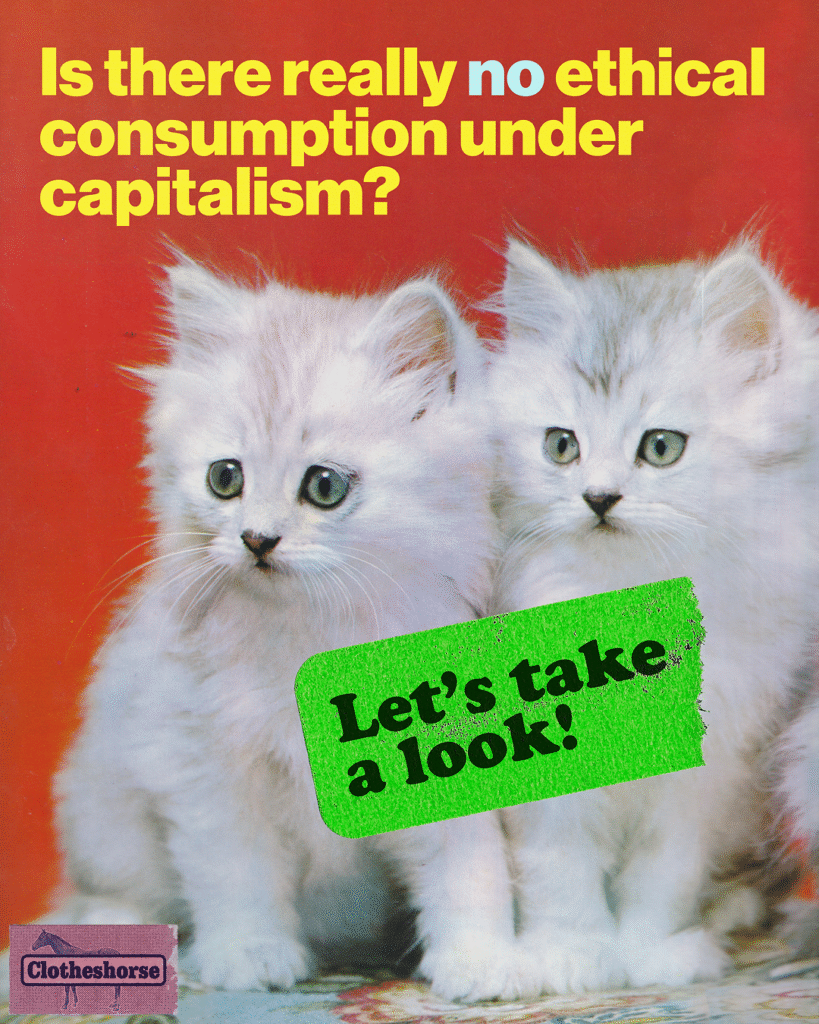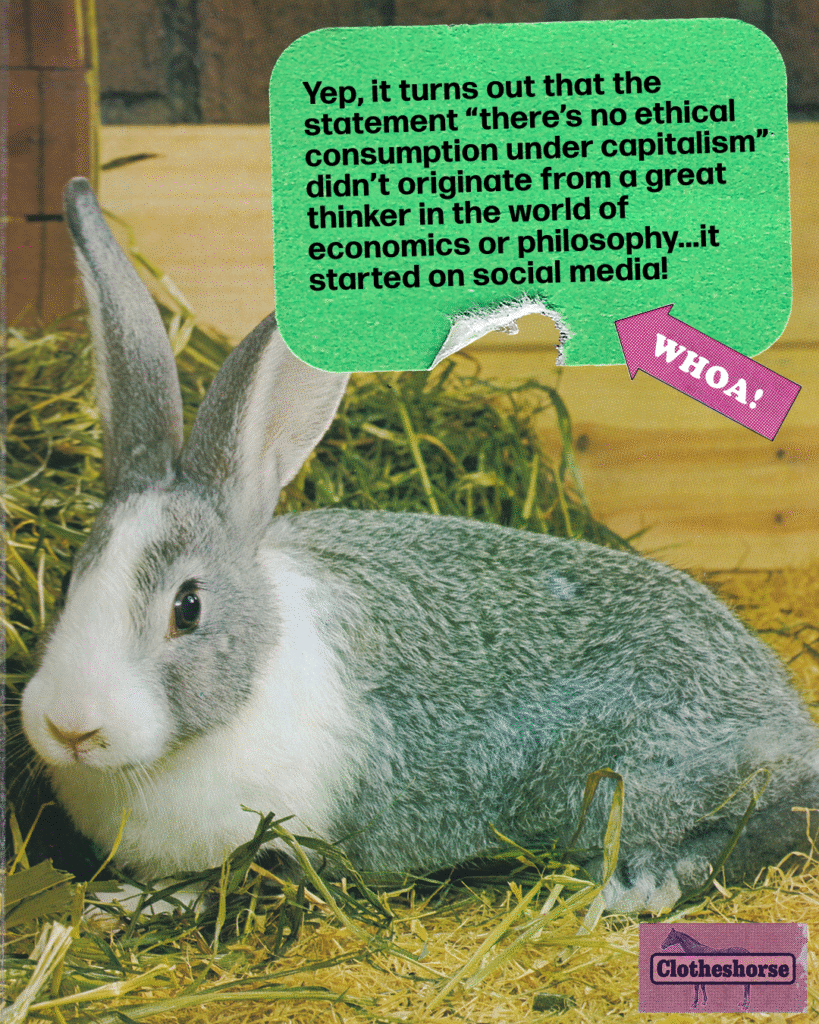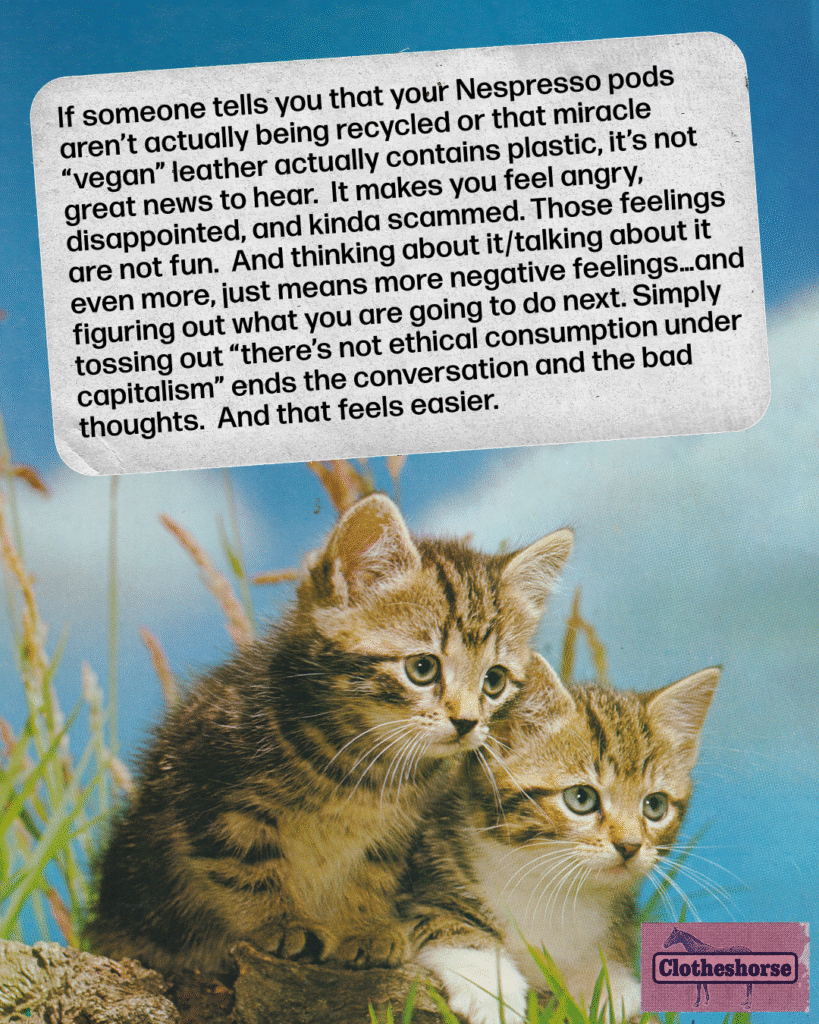
The statement “there is no ethical consumption under capitalism” often comes up in conversations about fast fashion…where did it originate?
No one seems to know who said it first, but many internet historians on Reddit seem to agree that it originated in the anti-capitalism corner of Tumblr in 2014, after a “feminist tee disaster.” From there, it spread across all the social media platforms.
What was the “feminist tee disaster?” UK retailer Whistles did a collection of feminist tees (“This is what a feminist looks like”) in partnership with Elle Magazine and the Fawcett Society (UK women’s rights non-profit). The Daily Mail published a story revealing that the shirts were made in a sweatshop in Mauritius, where the garment workers were paid about 77 cents per shirt.

Now we have reached a point where we have had numerous discussions about the ethics of a fast fashion “feminist” tee, but this was a new and shocking reality in 2014.
So naturally, this started a lot of online conversation about the ethics of clothing and consumption. After all, what’s the point of wearing a feminist tee if the women making it are being underpaid, overworked, and living in terrible conditions? How feminist is it to wear a tee made by exploited women?
Like a lot of social media discourse, the pendulum swung hard into serious black and white thinking:
It started with that sound idea of “why wear a feminist tee if it made was by exploiting women?” That makes sense, still makes sense.
But it quickly turned to “if you buy or consume anything, you are making the decision to support exploitation.” We know that is some seriously flawed thinking. Because to exist, to survive, we must consume: food, water, clothing, shelter, education, health care, and so much more. To live a fulfilling life, we need social time, hobbies, opportunities to explore our creative sides, and so on.
Next, the conversation shifted to “if you’re buying anything and not ensuring that it was made ethically–-meaning everyone was paid a living wage–-then you’re a bad person.”
And of course, we know that line of thinking is completely lacking in nuance. What if you don’t have the privilege of time, access, and most importantly, MONEY to buy only ethically made items? And also: there are certain trappings of modern life that are non-negotiable for existing within our society that don’t have truly ethical options: phones, computers, routers, stoves and ovens, washing machines, furnaces, hot water heaters, etc.
And that’s where the conversation of “there’s no ethical consumption under capitalism” came into play. It was intended to remind everyone that no matter where they bought it and how “clean” the supply chain was, there was no such thing as a “perfect” purchase of anything. There would always be an impact because consumption is never devoid of impact. Someone worked to make it happen. Resources were used.
It was meant (in good faith) to remind everyone that it was really privileged and short-sighted to pass judgement on those who bought clothes at Walmart or opted for the regular bananas over organic or drove an old car instead of a Prius because that is what they could afford and could access. It was intended to be a recognition that for many people the most ethical and sustainable option is what they can afford, not the one with all of the certifications attached to it.
It also meant that those who have the privilege of time, money, and access SHOULD make the most ethical choice available to them as often as possible. Maybe it won’t always be possible, but they should do their best to try to make the most ethical choice.
But the other thing about the original intention of “there’s no ethical consumption under capitalism?”
Recognizing that we can’t shop our way to a better future! A better world, where workers are paid a living wage and work under good conditions, where resources aren’t wasted, where products are better and longer lasting…that means that all of us need to get involved in fighting for change, by voting, protesting (when possible), having conversations with others, letting our elected representatives know that we want better regulation of all of these industries, and even running for office.
In other words: nothing gets better if we don’t get involved.
If people are using the statement “there’s no ethical consumption under capitalism” incorrectly, why do I see and hear it so often?
Let’s talk about “thought-terminating cliches.” They are statements used to shut down critical thinking or further discussion by offering a simplistic, often cliche, response to a complex issue.
Some examples:
“We’re doomed.”
“We’re cooked.”
“My impact will never be as big as Amazon, so who cares.”
“There’s no ethical consumption under capitalism.”
The problem with these thought-terminating cliches?They are effective at ending the conversation and getting us to move on to another subject. They repress any real positive change because progress begins with difficult conversations and questions, along with ugly truths. And while some people weaponize thought-terminating cliches to control others, most people are just using them because they feel scared and overwhelmed.

The irony of those Whistles feminist tees? The wages of the garment workers were actually higher than the minimum wage in Mauritius. And furthermore, several groups considered this factory to be in-line with an ethical code of conduct. Meaning, this factory wasn’t actually a “bad” factory and it wasn’t doing anything “wrong” from an industry perspective.
And yes, it’s super unfair that workers can get paid 77 cents for making a t-shirt that will sell for $60-70. No one involved in making, selling, or shipping that shirt will ever get a “fair” share of the selling price, while those at the top will take most of that money for themselves.
This is a broken system for everyone (except the wealthiest). When you see this illustrated time and time again, you can see how there really is no truly ethical consumption under capitalism.
But that doesn’t mean we give up completely.
That doesn’t mean we guilt ourselves about needing things.
It also doesn’t mean we take the bleak view that the world is @#$%ed and unfixable, and that we should just keep making Shein hauls until the world ends.
We have the power to make it better, no matter how overwhelming it all seems.
One person can’t change the world alone…but when we work together at the same time, we can create real change!
One of my favorite things about the slow fashion community is that there is a place for EVERYONE! We all play a part in a better world! Even small things like mending our clothes or washing them carefully are radical in a hyperconsumerist, fast everything world. Shopping small and local when we can. Opting for secondhand first. Mindfully rehoming our stuff. Eating our leftovers. Sharing information. Picking up litter. Voting. Supporting mutual aid. It all matters.
If you want to share your opinion/additional thoughts on the subjects we cover in each episode, feel free to email, whether it’s a typed out message or an audio recording: [email protected]
Slow Fashion Academy is a size-inclusive sewing and patternmaking studio based in Philadelphia, Pennsylvania. Designer and fashion professor Ruby Gertz teaches workshops for hobbyists and aspiring designers, so that anyone can learn the foundational skills of making, mending, and altering their own clothes. Ruby also provides professional design and patternmaking services to emerging slow fashion brands, and occasionally takes commissions for custom garments and costume pieces. She has also released several PDF sewing patterns for original designs under her brands Spokes & Stitches, and Starling Petite Plus. Check the schedule for upcoming workshops, download PDF sewing patterns, and learn about additional sewing and design services at www.slowfashion.academy.
Thumbprint is Detroit’s only fair trade marketplace, located in the historic Eastern Market. Our small business specializes in products handmade by empowered women in South Africa making a living wage creating things they love like hand painted candles and ceramics! We also carry a curated assortment of sustainable/natural locally made goods. Thumbprint is a great gift destination for both the special people in your life and for yourself! Browse our online store at thumbprintdetroit.com and find us on instagram @thumbprintdetroit.
Picnicwear: a slow fashion brand, ethically made by hand from vintage and deadstock materials – most notably, vintage towels! Founder, Dani, has worked in the industry as a fashion designer for over 10 years, but started Picnicwear in response to her dissatisfaction with the industry’s shortcomings. Picnicwear recently moved to rural North Carolina where all their clothing and accessories are now designed and cut, but the majority of their sewing is done by skilled garment workers in NYC. Their customers take comfort in knowing that all their sewists are paid well above NYC minimum wage. Picnicwear offers minimal waste and maximum authenticity: Future Vintage over future garbage.
Shift Clothing, out of beautiful Astoria, Oregon, with a focus on natural fibers, simple hardworking designs, and putting fat people first. Discover more at shiftwheeler.com
High Energy Vintage is a fun and funky vintage shop located in Somerville, MA, just a few minutes away from downtown Boston. They offer a highly curated selection of bright and colorful clothing and accessories from the 1940s-1990s for people of all genders. Husband-and-wife duo Wiley & Jessamy handpick each piece for quality and style, with a focus on pieces that transcend trends and will find a home in your closet for many years to come! In addition to clothing, the shop also features a large selection of vintage vinyl and old school video games. Find them on instagram @ highenergyvintage, online at highenergyvintage.com, and at markets in and around Boston.
St. Evens is an NYC-based vintage shop that is dedicated to bringing you those special pieces you’ll reach for again and again. More than just a store, St. Evens is dedicated to sharing the stories and history behind the garments. 10% of all sales are donated to a different charitable organization each month. New vintage is released every Thursday at wearStEvens.com, with previews of new pieces and more brought to you on Instagram at @wear_st.evens.
Deco Denim is a startup based out of San Francisco, selling clothing and accessories that are sustainable, gender fluid, size inclusive and high quality–made to last for years to come. Deco Denim is trying to change the way you think about buying clothes. Founder Sarah Mattes wants to empower people to ask important questions like, “Where was this made? Was this garment made ethically? Is this fabric made of plastic? Can this garment be upcycled and if not, can it be recycled?” Signup at decodenim.com to receive $20 off your first purchase. They promise not to spam you and send out no more than 3 emails a month, with 2 of them surrounding education or a personal note from the Founder. Find them on Instagram as @deco.denim.
The Pewter Thimble Is there a little bit of Italy in your soul? Are you an enthusiast of pre-loved decor and accessories? Bring vintage Italian style — and history — into your space with The Pewter Thimble (@thepewterthimble). We source useful and beautiful things, and mend them where needed. We also find gorgeous illustrations, and make them print-worthy. Tarot cards, tea towels and handpicked treasures, available to you from the comfort of your own home. Responsibly sourced from across Rome, lovingly renewed by fairly paid artists and artisans, with something for every budget. Discover more at thepewterthimble.com
Blank Cass, or Blanket Coats by Cass, is focused on restoring, renewing, and reviving the history held within vintage and heirloom textiles. By embodying and transferring the love, craft, and energy that is original to each vintage textile into a new garment, I hope we can reteach ourselves to care for and mend what we have and make it last. Blank Cass lives on Instagram @blank_cass and a website will be launched soon at blankcass.com.
Vagabond Vintage DTLV is a vintage clothing, accessories & decor reselling business based in Downtown Las Vegas. Not only do we sell in Las Vegas, but we are also located throughout resale markets in San Francisco as well as at a curated boutique called Lux and Ivy located in Indianapolis, Indiana. Jessica, the founder & owner of Vagabond Vintage DTLV, recently opened the first IRL location located in the Arts District of Downtown Las Vegas on August 5th. The shop has a strong emphasis on 60s & 70s garments, single stitch tee shirts & dreamy loungewear. Follow them on instagram, @vagabondvintage.dtlv and keep an eye out for their website coming fall of 2022.
Country Feedback is a mom & pop record shop in Tarboro, North Carolina. They specialize in used rock, country, and soul and offer affordable vintage clothing and housewares. Do you have used records you want to sell? Country Feedback wants to buy them! Find us on Instagram @countryfeedbackvintageandvinyl or head downeast and visit our brick and mortar. All are welcome at this inclusive and family-friendly record shop in the country!
Located in Whistler, Canada, Velvet Underground is a “velvet jungle” full of vintage and second-hand clothes, plants, a vegan cafe and lots of rad products from other small sustainable businesses. Our mission is to create a brand and community dedicated to promoting self-expression, as well as educating and inspiring a more sustainable and conscious lifestyle both for the people and the planet. Find us on Instagram @shop_velvetunderground or online at www.shopvelvetunderground.com
Selina Sanders, a social impact brand that specializes in up-cycled clothing, using only reclaimed, vintage or thrifted materials: from tea towels, linens, blankets and quilts. Sustainably crafted in Los Angeles, each piece is designed to last in one’s closet for generations to come. Maximum Style; Minimal Carbon Footprint.
Salt Hats: purveyors of truly sustainable hats. Hand blocked, sewn and embellished in Detroit, Michigan.
Republica Unicornia Yarns: Hand-Dyed Yarn and notions for the color-obsessed. Made with love and some swearing in fabulous Atlanta, Georgia by Head Yarn Wench Kathleen. Get ready for rainbows with a side of Giving A Damn! Republica Unicornia is all about making your own magic using small-batch, responsibly sourced, hand-dyed yarns and thoughtfully made notions. Slow fashion all the way down and discover the joy of creating your very own beautiful hand knit, crocheted, or woven pieces. Find us on Instagram @republica_unicornia_yarns and at www.republicaunicornia.com.
Cute Little Ruin is an online shop dedicated to providing quality vintage and secondhand clothing, vinyl, and home items in a wide range of styles and price points. If it’s ethical and legal, we try to find a new home for it! Vintage style with progressive values. Find us on Instagram at @CuteLittleRuin.